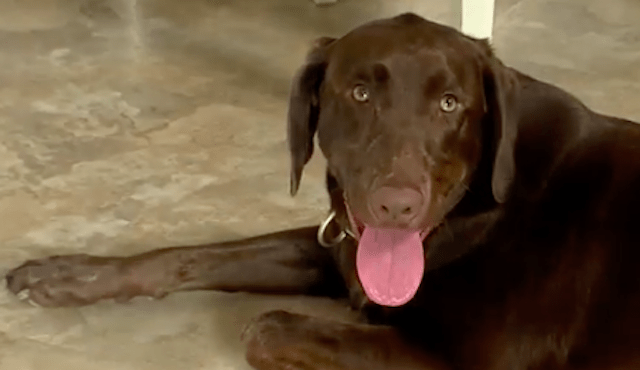Whether or not their dog has formal training, most pup parents would say that their canine companions ease their anxiety by providing joy and comfort. But for a Marine veteran named Stacey Thompson, her new service dog only contributed to her stress.
Thompson suffers from PTSD after being raped by her sergeant while she served. After the ordeal, the wife and mother of three frequently travels to give motivational speeches.

Following one of her events, a representative from Labs for Liberty, a non-profit organization, approached the veteran to say that they’d like to provide her with a service dog.
Thompson and Labs for Liberty communicated over the next several months, and they paired her with Reef, a Chocolate Lab who was trained by a volunteer in Utah. The pup learned basic obedience, as well as tasks that were meant to ease Thompson’s anxiety while she was traveling and giving speeches.
Thompson and Reef met twice before it was time for the 8-month-old pup to go to his new home. The dog put his paws on his human’s shoulders when she bent down to greet him, and according to News 10, Thompson said this was “a red flag.”
Once Reef was brought to Southern California, Thompson realized there was much more hustle and bustle than where he’d grown up in Utah. According to News 10, Reef couldn’t handle the stimulation of crowds and other dogs, barking and lunging. She could not fathom bringing him to airports and on planes accompany her on her travels.
Watch a news clip on the story here:
The rambunctious pup would even try to mount her leg, something she found particularly disturbing. “As a MST (military sexual trauma) survivor, it is completely inappropriate,” she told News 10.
Joan Nold, the President and Founder of Labs for Liberty, told News 10 that Thompson wasn’t supposed to get Reef until he was a few months older.
“She was quite insistent that she really needed Reef,” Nold said in the story, adding that she informed Thompson he’d need continual training. “She kept assuring us that she could handle that, especially with our support.”

Nold said that some of the aforementioned behaviors had never been reported to her before and they tried to work with Thompson to continue training with Reef. They’d even agreed to take him back for additional training, but Thompson ultimately decided against it.
Thompson, on the other hand, says that little support was offered.
“You call their one trainer, and they have up to 72 hours to get back to you,” she said to News 10. “That doesn’t work when I’ve got a live animal who’s doing behaviors that are not only anxiety-provoking, but frightening.”
Thompson started a Facebook page about her experience, and says she was contacted by six other veterans who were paired with under-trained dogs. She hopes that her experience will prevent other veterans from being in the same situation.
She said in the story:
“The brothers and sisters who served do not deserve to have the expectation of bringing home a service dog that will eventually cause them more anxiety, more hyper-vigilance, more stress. That can put them in a place where again they’re having suicidal thoughts, they’re thinking about going back to drugs and alcohol, or….that is not the purpose of this.”

Although Thompson is grateful to the organization for getting her a service dog, the mental well-being of veterans is of “utmost importance.”
Nold, on the other hand, considers this situation “a misunderstanding of expectations.”
“Our veterans get the satisfaction of helping to polish their own dog,” Nold told News 10. “We believe no dog is ever fully trained.”
Thompson will no longer be working with the organization, at her request. Labs for Liberty responded:
“We wish her the very best. We want her to heal and be whole and move on and we know she’ll take good care of Reef and so that gives us comfort.”
However, Thompson is keeping Reef, as he’s become part of the family. They are working with a local dog trainer named Carol Dupuis, who is providing her services free of charge. Dupuis says that the pup will need another 6-8 months of training in order to be “service dog ready.”
As Reef continues his training, Thompson is learning how to be a proper handler.
“When you give a dog to someone who doesn’t know anything about dog training then the dog gives her instruction,” Dupuis said in the story. “And it doesn’t work.”
We want to know: what do you think of this story?
